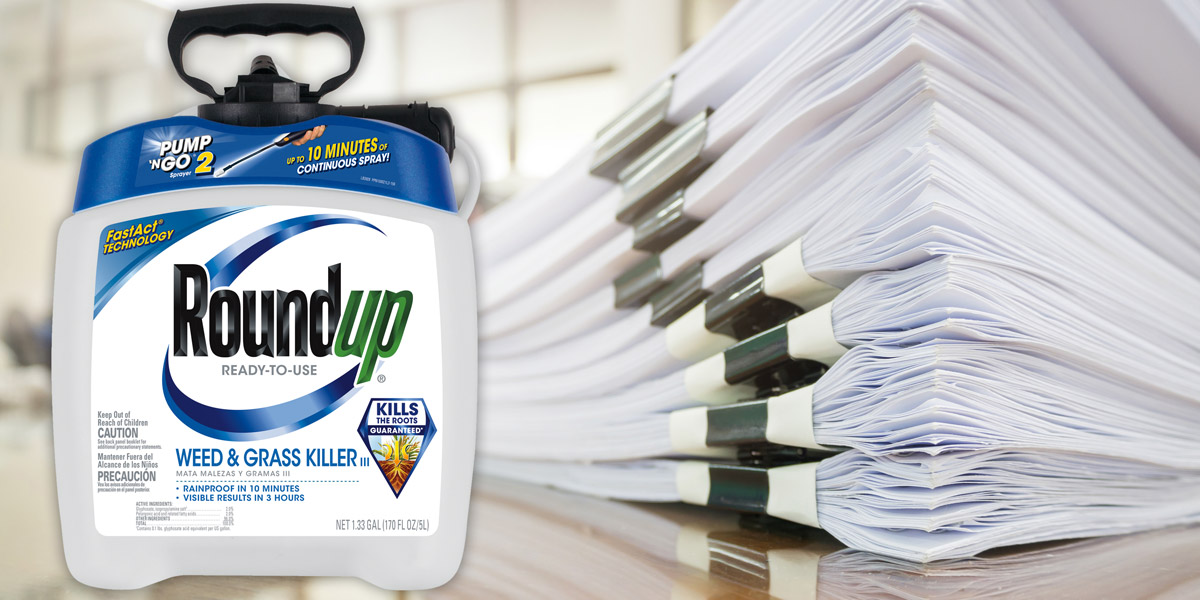
Health and environmental groups raise alarm
Health and environmental organisations have expressed severe concerns after the European Chemicals Agency’s Committee for Risk Assessment (RAC) concluded that the widely used pesticide active substance glyphosate (the main ingredient of Roundup herbicide) does not meet the criteria to be labeled as a carcinogenic or genotoxic agent.[1]
The Health and Environment Alliance (HEAL), the European Environmental Bureau (EEB) and ClientEarth, who attend the RAC as civil society observers, have been critical of the committee’s discussions on glyphosate.
According to three independent scientists who attended the RAC meetings alongside the civil society organisations,[2] there are major incoherences in the EU’s scientific evaluation of the genotoxicity and carcinogenicity potential of glyphosate. In their presentations to RAC members, the scientists highlighted that all the evidence available, including the cancer studies submitted by pesticide manufacturers themselves, indicate that glyphosate has the potential to cause cancer. Furthermore, the experts explained that industry’s studies on the genotoxicity of glyphosate are incomplete and that the RAC should not draw conclusions on the hazard characterisation of this substance based on these studies alone.
The RAC’s failure to classify glyphosate as a carcinogen suggests that the important arguments presented by the independent scientific experts have not been considered properly. This points towards serious inconsistencies in the way EU agencies examine available scientific evidence, which can lead to harmful chemicals being marketed as “safe”.
Dr Angeliki Lyssimachou, senior science policy officer at HEAL, said: “Similar to the 2017 opinion on the hazard potential of glyphosate, the EU Chemicals Agency has once again dismissed the scientific arguments on the pesticide’s carcinogenicity and genotoxicity brought by independent experts. The failure to recognise the carcinogenic potential of glyphosate is a mistake, and should be considered as a big step backwards in the fight against cancer.”
Dolores Romano, deputy policy manager for chemicals at EEB, said: “This file shows the urgent need to address the systemic deficiencies of the process to classify hazardous chemicals in the EU, such as the extremely high level of evidence required, the major gaps of data sources, the dismissal of independent scientific evidence and the lack of a precautionary approach.”
Helene Duguy, chemicals lawyer at ClientEarth, said: “Some of the world’s leading scientists have made the link between glyphosate and cancer – yet ECHA refuses to label this harmful pesticide as a carcinogen. Unfortunately, it is not the first time ECHA has failed to transparently and clearly justify its dismissal of independent scientific evidence. That’s incredibly worrying given the EU’s commitment and duty to protect its citizens and the environment from the most hazardous substances.”
Glyphosate is the most widely used pesticide in the world, which is of concern since its negative impacts on human health and the environment are well-documented. The World Health Organization’s International Agency for Research on Cancer (IARC), the gold standard for cancer research, finds glyphosate is a probable human carcinogen.[3]
Exposure to glyphosate-based pesticides has also been linked to adverse effects on human development, reproduction and hormonal systems, according to evidence from the independent scientific literature [4].
ECHA’s opinion on the hazard classification for glyphosate is a foundational step in the renewal process of the active substance, including for the upcoming safety evaluation by the European Food Safety Authority (EFSA).[5] Based on these evaluations the EU Commission and Member States will decide on the renewal of glyphosate’s licence for another 15 years.
Notes
1. https://echa.europa.eu/nl/-/glyphosate-no-change-proposed-to-hazard-classification
2. The Health and Environment Alliance (HEAL), the European Environmental Bureau (EEB) and ClientEarth invited the following experts to present their findings to the RAC:
Prof Siegfried Knasmüller (Medical University of Vienna Center for Cancer Research)
Dr Christopher J. Portier (expert in the design, analysis and interpretation of environmental health data with a focus on carcinogenicity)
Dr Peter Clausing (toxicologist)
3. https://www.iarc.who.int/featured-news/media-centre-iarc-news-glyphosate/
4. See for example:
https://www.env-health.org/health-effects-of-glyphosate-can-be-passed-down-to-other-generations-shows-new-study-on-rodents/
https://www.env-health.org/new-scientific-study-confirms-health-concerns-about-glyphosate-based-herbicides/
https://www.env-health.org/low-dose-long-term-exposure-to-roundup-causes-disease-in-rats/
Zhang et al 2019. Exposure to glyphosate-based herbicides and risk for non-Hodgkin lymphoma: A meta-analysis and supporting evidence. Mutation Research/Reviews in Mutation Research, 781:186-206 https://doi.org/10.1016/j.mrrev.2019.02.001
5. https://www.efsa.europa.eu/en/news/glyphosate-efsa-and-echa-update-timelines-assessments
Source: HEAL










